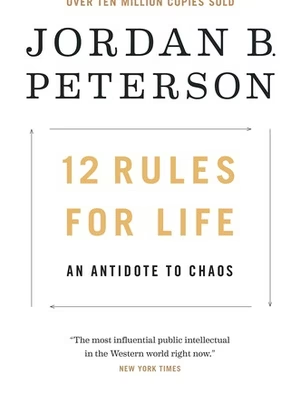Overview
12 Rules for Life is a tough-love guide to growing up and taking responsibility. Jordan Peterson believes that life involves suffering, but that we make it unbearable when we lie, avoid responsibility, or let resentment take over. The book isn't just about following rules; it is about building a character strong enough to handle the heavy burden of being alive.
Peterson uses stories from the Bible, biology, and clinical psychology to make his points. The core message is simple: you can’t fix the whole world, but you can fix yourself. By adopting meaningful responsibility, you can create just enough order to keep the chaos at bay.
My Take: The "Chaos vs. Order" Check-In
Many people find this book dense or controversial, but I read it through a specific lens that I call the "Chaos vs. Order Check-In." Peterson says we need to have one foot in Order (where things are stable and known) and one foot in Chaos (where we learn new things).
I use this summary as a diagnostic tool. If I feel bored and stagnant, I have too much Order, I need to take a risk (Rule 4 or 7). If I feel anxious and overwhelmed, I have too much Chaos, I need to clean my room or tell the truth (Rule 6 or 8). As you read these rules, ask yourself: "Which side of the line am I falling off of right now?"
Key Takeaways
Fix Your Posture First
It sounds simple, but Peterson’s first rule about standing up straight is biological. He explains that when you slouch, your brain produces less serotonin, making you feel smaller and more anxious. By physically standing tall, you signal to your brain (and others) that you are ready to face the world, which actually helps you handle stress better.
Compare Yourself to Your Past Self
Comparing yourself to others is a trap because you only see their highlight reel, not their struggles. Instead, Peterson suggests you "compare yourself to who you were yesterday." If you are slightly better than you were yesterday, that is progress. It turns life into a game you can actually win.
Pursue Meaning, Not Happiness
Happiness is a fleeting emotion that comes and goes, but meaning sustains you through hard times. Peterson argues that meaning comes from voluntarily taking on responsibility, for yourself, your family, and your community. Doing what is "expedient" (easy/fun now) often leads to misery later, while doing what is meaningful pays off in the long run.
Stop Lying
One of the strongest themes in the book is the danger of lying, even "white lies." Peterson believes that every lie corrupts your ability to see reality clearly. If you can’t tell the whole truth yet, start by not lying. This simple act clears up a huge amount of mental fog and chaos.
The 12 Rules (Chapter Breakdown)
Rule 1: Stand up straight with your shoulders back
This chapter uses the biology of lobsters to explain hierarchies. Winners get more serotonin and stand tall; losers curl up and get anxious. Peterson argues you should adopt the posture of a winner to jumpstart your own brain chemistry and face life with courage.
Rule 2: Treat yourself like someone you are responsible for helping
People often give their pets medication faithfully but forget to take their own. Peterson says this is because we know our own flaws and don't think we deserve care. He urges you to treat yourself with the same compassion you would show a loved one or a pet.
Rule 3: Make friends with people who want the best for you
Surrounding yourself with people who drag you down isn't loyalty; it's stupidity. True friends will celebrate your victories and call you out when you are acting wrong. It takes courage to choose friends who demand the best from you, because it means you have to improve, too.
Rule 4: Compare yourself to who you were yesterday, not to who someone else is today
There will always be someone richer, fitter, or smarter than you. Comparing yourself to them leads to bitterness. Focus on incremental improvement in your own life, fixing one small thing today makes you better than you were yesterday.
Rule 5: Do not let your children do anything that makes you dislike them
If you let your kids behave badly, other people will dislike them, and they will fail socially. Peterson argues that it is a parent's duty to socialize their children so they are welcome in the world. Discipline is not cruelty; it is a necessary tool to help children fit into society.
Rule 6: Set your house in perfect order before you criticize the world
It is easy to blame society or politics for your unhappiness. Peterson suggests you stop complaining about the world until you have fixed your own life, cleaned your room, stopped lying, and mended relationships. Humility starts at home.
Rule 7: Pursue what is meaningful (not what is expedient)
"Expedient" means doing what works right now to avoid pain or get a quick reward. "Meaningful" implies sacrifice, giving up something now for a better future. This chapter argues that sacrifice is the root of all civilization and personal growth.
Rule 8: Tell the truth, or, at least, don't lie
Lies warp your perception of reality. When you lie to avoid conflict, the conflict just grows in the background until it explodes. Peterson advises that if you can't speak the full truth yet, you should at least stop saying things you know are false.
Rule 9: Assume that the person you are listening to might know something you don't
Most people don't listen; they just wait for their turn to speak. True listening involves humility and the desire to learn. If you listen carefully, people will tell you amazing things, and you might learn how to solve your own problems.
Rule 10: Be precise in your speech
Vague anxiety is terrifying because it has no borders. When you define a problem precisely (e.g., "I am mad because you didn't do the dishes," not "I hate our marriage"), it becomes solvable. Precision turns a monster into a manageable task.
Rule 11: Do not bother children when they are skateboarding
This chapter is about risk and competence. Kids need to take risks (like skateboarding) to learn their limits and become brave. If we make society too safe, we prevent people from developing the toughness they need to survive real challenges.
Rule 12: Pet a cat when you encounter one on the street
Life is hard and full of tragedy. This rule is a reminder to stop and appreciate the small, good moments when they happen. It’s about finding brief moments of grace and gratitude even on bad days.
Main Concepts
The Lobster Hierarchy
One of the most famous ideas in the book involves lobsters. Peterson notes that lobsters have existed for millions of years and run on serotonin, just like humans. When a lobster wins a fight, it flexes and gets confident; when it loses, it shrinks. This teaches us that hierarchies are not just social constructions, they are ancient and biological. We need to voluntarily "climb" the hierarchy by being competent, or we will feel chemically miserable.
Order (The Known)
- Structure and routine
- Safety and predictability
- Too much leads to tyranny
- Represents "The Father" archetype
- Stagnation without new input
Chaos (The Unknown)
- Possibility and potential
- Danger and anxiety
- Too much leads to confusion
- Represents "The Mother" archetype
- Transformation and growth
The Tragedy of Being
Peterson assumes that life is tragic. Everyone you love will die, and you will suffer. This sounds depressing, but he uses it as a call to action. Because life is hard, you have a moral obligation to be strong. If you are weak, you make the tragedy worse. If you are strong, you can bear the suffering without becoming corrupt.
How to Apply the Ideas This Week
You don't need to overhaul your whole life overnight. Here are four small, concrete actions based on the rules that I found easy to test out immediately.
- The Posture Check (Rule 1): Catch yourself slouching? Correct it immediately. Pull your shoulders back, take a deep breath, and look people in the eye. Notice if you feel slightly more confident after 5 minutes.
- The Tiny Clean-Up (Rule 6): Pick one small area, a drawer, your desktop, or your car, and organize it perfectly. Don't try to fix the world today; just fix that one square foot of space.
- The Truth Challenge (Rule 8): Try to go 24 hours without telling a single lie, not even a "nice" one. If you can't tell the truth, stay silent. Watch how this changes your conversations.
- The Listening Exercise (Rule 9): In your next conversation, do not speak until you can summarize what the other person just said to their satisfaction. This forces you to actually listen instead of just planning your next sentence.
Memorable Quotes
“Compare yourself to who you were yesterday, not to who someone else is today.”
“To stand up straight with your shoulders back is to accept the terrible responsibility of life, with eyes wide open.”
“Pursue what is meaningful (not what is expedient).”
“If you cannot understand why someone did something, look at the consequences, and infer the motivation.”
Who I Think Should Read This Book
- People feeling lost or aimless: If you feel like you are drifting, the focus on responsibility and meaning provides a very heavy but solid anchor.
- Young men (and women) growing up: This book is famously popular with young men, likely because it provides clear, fatherly advice on how to grow up and be useful.
- Parents: The chapter on parenting (Rule 5) is controversial to some but essential for anyone who wants to raise kids that other people actually like.
- Anyone prone to resentment: If you find yourself angry at the world or feeling like a victim, this book challenges you to look in the mirror before blaming others.
What Other Readers Are Saying
12 Rules for Life is a polarizing book, but the numbers are undeniable. On Amazon, it has a massive following with a rating of roughly 4.7 out of 5 stars. Readers frequently call it "life-changing" and appreciate the mix of hard science, philosophy, and practical advice.
On Goodreads, it holds a score of around 3.9 out of 5 stars from hundreds of thousands of ratings. Critiques often mention that the book can be rambling or overly religious in its examples. However, even many critical readers admit that the core advice, taking responsibility and telling the truth, is profound and useful.
-
Read reviews on Amazon:
12 Rules for Life on Amazon
* Affiliate link. I earn from qualifying purchases.
- Read reviews on Goodreads: 12 Rules for Life on Goodreads
Final Thoughts
This book changed how I view my own bad days. Before, I might have wallowed in self-pity. Now, I use my "Chaos vs. Order" check-in. I realize that if I want life to be better, I have to make it better, usually by doing something small, boring, and difficult, like telling the truth or finishing a task I've been avoiding.
If you read 12 Rules for Life, don't get hung up on the complex philosophy or the Bible stories if they aren't your thing. Focus on the practical side: Stand up straight. Clean your room. Don't lie. It turns out that these simple rules, when you actually follow them, are powerful enough to change your life.
Ready to Get Your House in Order?
If this summary resonated with you, the full book goes much deeper into the "why" behind these rules. It’s a dense read, but one that rewards you for every page you finish.
Get 12 Rules for Life on Amazon* Affiliate link. I earn from qualifying purchases.

